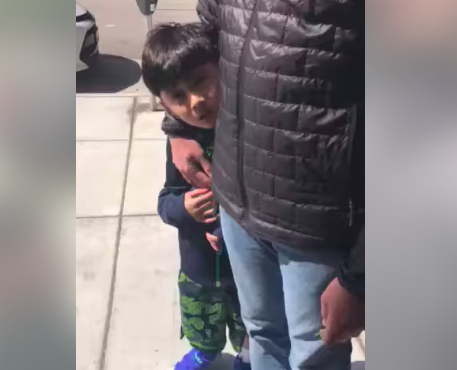Confessions of a Woman of Color at an Ordinary Summer Cookout
By: Iyabo Onipede – Confluence Daily is your daily news source for women in the know.
I had dinner with an old friend, an African American lady and her most amazing daughter recently. Her kinfolk, family from near and far, were over. Her family is a wide range of racial mixtures.
At one point, I was out on the back porch with my friend and the following people:
- A young man who was adopted by white parents but is biracial black and white and has spent some time in the military.
- Her niece who is half black and half Spanish and looks white.
- Her niece’s boyfriend who was white.
And the conversation turned to the Confederate flag, #45 in the White House (whose name shall not be mentioned) and the issue of race. At some point, during the back-porch session, these words were spoken:
The young black man who was adopted by white parents bragged about how he had been pulled over with a suspended license ten times but never served any jail time although he is black because he “knows how to talk to the police” and he is “knowledgeable.” He also said that all the black people who “had gotten themselves killed by the police” did so because “they were criminals and deserved to die. They did something wrong after all and their hands were not clean!” At some point, he also said, “Slavery made America the greatest country in the world.”
The niece said, “Was I supposed to vote for Hilary because she was a woman? I don’t think so! I think (#45) is a better leader as he says what is on people’s minds and he is an awesome business man. But it does not matter since I do not vote anyway.”
She also said, “I may have black in me, but I do not behave like those type of ‘black people’ (air quotes).” When my friend pointed out that she (the aunt) was black, her niece said, “But you are different.” The niece had been on welfare once and was in support of cutting the program back because although she needed it at the time, she was upset that there are people on welfare who drive a BMW and collect welfare checks.
The white young man said, “I don’t know why we are having this conversation. Things are so much better than ever before. I don’t complain, and black people are racist towards me all the time.” He also asked me to stop talking at one point because according to him, I had spoken for 15 minutes non-stop and said, “You just feel sorry for yourself just because you have experienced things that other people got away with and you did not.”
.
.
.
.
.
I stutter. Still.
I had not been talking for 15 minutes and I wondered why he felt he had the sole authority to silence me.
Honestly, I am still processing.
My brain shut down. And I do not think it is back in full gear yet. I do not know what to say. My friend and I were stunned.
I wondered if I was in an alternative reality. As the evening progressed, I realized that the last thing I wanted to do was shut down and not listen closely. I thought this was a great opportunity to stretch myself, practice compassion and hear things that I usually did not hear. I tried to bottle up my words for a more receptive venue and just notice all my feelings. They were not pretty. Not at all.
The two men left the porch after a while and the niece stayed. I began to admire this niece who came into a realization that she wanted to engage. She did not walk away. We listened. She gave her positions. She learned. We heard. We taught her about bias and how the brain works by congregating information. We helped her understand how racism is not logical and blinds us to people’s realities.
We questioned her assumptions. She said, “Why are blacks so loud and raunchy? Why do they all behave like that? Not all white people behave like that. Some do, but not all.” We pointed out that not “all” black people behaved in the negative way she described. We pointed out how she was describing more an issue of poverty than race as the behavior she described was common among various groups of people including poor blacks, Latinos, and whites. We talked about what “access” means for poor people. We also pointed out how she had been taught that the acceptable standards of behavior were based on white middle-class values and expressions of behavior. We explained that this was “white supremacist culture” that she was supporting.
She did not know what she did not know. Nobody had ever taken the time to express any of this to her and she had no idea that she was prejudiced. No one had ever challenged her system of beliefs. When she talked about #45, she just saw a wealthy successful man who could make everyone wealthy and successful if they worked hard like he did. She is willing to work hard so she can become like him. Yet, she acknowledged that she was steadily falling behind.
We questioned her sources of information. Needless to say, only one news station stays on the TV screen in her home. Her relationships with others also support her ideologies.
Y’all, we’ve ALL got some work to do.
I would like to tell you, dear reader, that I had some major epiphany and I learned something deep and life changing but I cannot tell you that. I came away even more committed to my positions and alarmed at how it is so foreign to others that we need each other, and human compassion is necessary in our political system.
I think the power moment was in the room when the men left the room and the three women tried to find a place of connection. I was deeply impressed with this niece who felt a clear difference from our positions but chose to stay and continue to engage.
Then I realized that I felt vulnerable. I felt overly vulnerable and not “safe” around the men who held very different views from mine in the world but that was not the issue. The issue was that their worldview did not have space for someone like me and my worldview held space for them. I did not shame them for believing differently from me. But they said, “O, that is just naive. That is just ignorant.” I believe the white male shut me down because he is not used to listening to a woman talk for 15 minutes, and a black, immigrant, and articulate one at that. Finally, they walked away. Not because they were not heard because I was sure to make sure I invited their perspective into the conversation, but they left, probably because they could not dominate the conversation or engage in a different viewpoint. They put their stake in the ground and it did not matter what anyone else thought.
For the niece, we could find space for each other in each other’s worldview. I wondered if this was because we were all women looking for how to make space for our children and families.
There is so much to unpack from this event but there are some critical things I want to address:
- Differing political views are fine. I don’t like who you voted for, but I am willing to listen to the values behind the person and the tangible benefits that the person is promoting. “He says it like it is” does not satisfy my definition of leadership. Please gather your information from different news stations.
- There are so many people that absolutely believe that all you need is “hard work” to accomplish anything good in life. These precious humans have no sense of community and belonging as factors that have helped them. This is a myth.
- Self-hate is when you think so poorly of a particular group of marginalized people and you do not recognize that you are part of that population.
- When you vote (sometimes by not voting) against your own self-interest, it is time to examine your own prejudices relating to gender, race, and class. Sometimes, there is an underlying value and not the political issue. In this case, I think that voting for #45 (by not voting) was because this person was dazzled by wealth. Wealth does not equate with virtue.
- If you think that hard work and knowledge will keep you alive in this world, well…. I wish you well and I only hope for good things for you. Especially if you are part of a marginalized group. Do pay attention to the fact that the finish line keeps moving and the standards keep changing just because there are a diversity of players on the playing field.
- Just because there are multiple encounters daily of black men with the police who leave the situation alive does not invalidate that there is a systemic problem with police killing black men indiscriminately.
- Racism has a power component. Everyone is biased and can have biases against others that are in groups that are different. However, racism is when your group has power over another group and you exert words and actions against that person with the intent to use your power against that person. Racism is defined as “prejudice, discrimination, or antagonism directed against someone of a different race based on the belief that one’s own race is superior.” Bias is defined as “prejudice in favor of or against one thing, person, or group compared with another, usually in a way considered to be unfair,” i.e. In the US of A, African Americans cannot be racist against whites, but whites can be racist against blacks. Blacks can be biased against whites.
- Although we have an African American Supreme Court Justice, a former president who is African American and many other African Americans who have “made it,” racism is still alive and well. If your Facebook timeline does not daily have videos of incidents of racism in your own communities, then you have sanitized your timeline and you have a wonderful luxury of not recognizing the lived realities of those that are proximate to your locale.
- Colorism is as much an issue as racism in this country. It is defined as “prejudice or discrimination against individuals with a dark skin tone, typically among people of the same ethnic or racial group.” It showed up last night as light skinned folks who have been able to navigate the system under the radar and think that somehow their behavior has earned them a better place in society. Just because they have not experienced the same things as their darker skinned counterparts, they think they are superior humans to them.
- This next one requires profound gentleness. As the child of a White mother and a Yoruba father and as an immigrant, I never understood why African Americans get upset when a white person/family adopts an African American child. I love inter-racial adoptions. Finally, I understood it. I felt so sorry for that young man who was raised by white parents because he had no solidarity with the African American community and his life is in danger and he has no clue. He was highly critical of blacks and felt he had not experienced what they experienced because he behaved “differently.” I asked him if he felt his parents had prepared him to be “black” in this country and he said, “I have no idea. They did not have to.” Parents of black kids, if you are not having conversations with your kids about their racial identity, then you are denying them the protection of their lives and fullness of their humanity.
Y’all, I am tired. I see why African Americans feel it is not their responsibility to educate others about race. It is very hard work to talk to someone who does not see you as a full human being and denies not seeing you as that.
This is how the evening ended. The niece shed a few tears on the porch and hugged me as I began to take my leave. She thanked me for taking the time to talk to her. I walked into the living room and said my goodbyes. The young black man who was adopted by white parents was cordial, yet trepidatiously held his hand out to me and said, “It was nice meeting you.” I did not take his hand. I tilted my head to the side, furrowed my brow, and held out my arms very wide and said, “I am a hugger.” His face broke into a huge smile and he gave me one of the best hugs I have ever received.
The white young man sat on the couch and suddenly got busy with his phone. I called his name and said, “It was nice meeting you.” He looked up briefly and said, “Yeah, take care” and went back to his phone. I went over and shook his hand. He never got up and never made eye contact.
As my friend walked me to my car, we were both somber. Words did not need to be exchanged. As we got to my car, we began to converse, and she told me something I did not realize at the time. She told me that the reason the white male behaved the way he did was that this was probably the first time in his life that he had to defend his whiteness. He was the only white person in the room at the time and his antagonism was a reflection of his discomfort as he defended his race.
That made me sad.
I drove away trying to redeem the evening. I realized that I showed up and did what I do with people who did not agree and thought differently from me and I still tried to stay engaged. I searched my heart and I found no judgment, just compassion, even for the white man who could not look me in the eye.
Vulnerability hurts, and it is risky, but it is worth it. I slept like a log that night with a clear conscience. This is hard work, y’all.
More by Iyabo:
Kate Spade & What I Learned Over Years of Losing Everything While Battling Clinical Depression
9-1-1 What’s your emergency? Yes, It Even Happened to Bob Marley’s Granddaughter
 Iyabo is a Leadership Development Coach whose work focuses on the soul of the leader. She moves leaders from thriving careers into discovering, crafting and living into their life work. By helping successful people integrate spirituality into their leadership roles, they become more engaged with their work, expand the connection of their work to social justice issues and experience more satisfaction in their life work. Using the power of narrative and reflection, she helps leaders fine tune the sacred “work their souls must have” (Alice Walker).
Iyabo is a Leadership Development Coach whose work focuses on the soul of the leader. She moves leaders from thriving careers into discovering, crafting and living into their life work. By helping successful people integrate spirituality into their leadership roles, they become more engaged with their work, expand the connection of their work to social justice issues and experience more satisfaction in their life work. Using the power of narrative and reflection, she helps leaders fine tune the sacred “work their souls must have” (Alice Walker).
Iyabo is located in Atlanta, Georgia and graduated from Goucher College (B.A.), Georgetown University Law School (J.D.) and Candler School of Theology at Emory University (M.Div.).
Iyabo’s home on the web is at http://www.coachiyabo.com
Confluence Daily is the one place where everything comes together. The one-stop for daily news for women.





